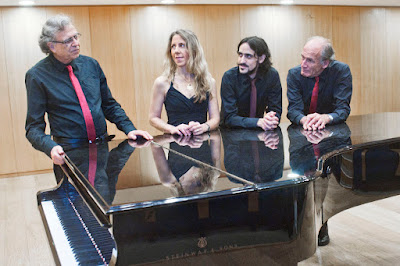 |
| Meir Wiesel, Ifat Zaidel, Tavor Gochman, Bart Berman (Maxim Reider) |
Following the two-year long silence
imposed on performing artists by the Covid-19 pandemic, Octopus, the Israeli
Pianists Quartet, has returned to the concert hall with an original and unique
program of music and poetry. Joining Ifat
Zaidel, Bart Berman, Tavor Gochman and Meir Wiesel, (four pianists on two
pianos) was actor Alex Ansky. "I Know a Forest", a
two-dimensional program, took place at the Tzavta Theatre Tel Aviv on June 1st
2022.
The theme of nature and forests gave
rise to the event's opening works and poems, either directly or by allusion. As
to the latter, Robert Schumann’s rarely performed Andante
and Variations in B-flat major Opus 46, originally written for two pianos, two
'cellos and horn, was rearranged by Schumann himself for two pianos. The setting
we heard, that of Ernst Naumann/Bart Berman, recreated the
unusually lush dark and warm colours of Schumann's original scoring. The four pianists gave expression to the work's
lyricism, poetic beauty and understated virtuosity, their playing, rich in
textures, moving between frolicsome, restless sections and idyllic tranquillity,
so characteristic of Schumann's rich inner world, as they preserved the
home-oriented intimacy of 19th century chamber music. The program that inspired
Alexander Glazunov's "The Forest'', Fantasia for Grand Orchestra Op.19, a
work influenced by the realm of fairy-tales, starts thus: "Frightening is
the forest at night when the trees take the forms of monsters, and mysterious
sounds fill the air." Performing K. Chernoff’s wonderfully pianistic
setting for eight hands of "The Forest", a dark and highly Romantic
work of large proportions, the artists gave a vivid reading of the pantheistic
tone-poem, its emotional content layered with fear, apprehension, gloom,
foreboding and magic.
And to the program's
Spanish content (works by two French composers!), many of us are familiar with
Spanish violinist Pablo de Sarasate’s "Carmen Fantasy" (1883),
a celebration of the rich and exotic melodies from Bizet's best-loved opera. Another such
work is the "Carmen Fantasie", a virtuoso showpiece for violin and
orchestra constituting a section of Franz Waxman's score to the 1946 movie
"Humoresque". At the Tel Aviv concert, the Octopus players gave a
polished and refreshing performance of the "Fantasy On Themes From Bizet's
Carmen", written for two pianos-eight hands, by American composer Mack
Wilberg (b.1955). Drawing on familiar themes from Georges Bizet's opera - the
Toreador Song, the Habanera, the Act II prelude, and Carmen's "Chanson
Boheme" - Wilberg's interesting writing, with its elegant use of
dissonance, its Spanish fire and allusions to the story's passion, lust,
jealousy, obsession, and revenge, made for a fascinating item. Emmanuel
Chabrier's work for orchestra "España", originally conceived as a
piece for piano duet, was the outcome of the composer's research trip on the
folk music and dances of Spain. Although deprived of the play of timbres of the
various instrumental combinations in the orchestral version, Camille
Chevillard's arrangement of "España" for two pianos-eight hands
nevertheless captures the light and warmth of Spain and the sensuous allure of
Spanish dance - the fiery jota and the slow, sultry malagueña - as well
as the virtuosic nature of the original score, as the artists engaged the
full resources of two pianos to present the work's spicy mix of rhythms,
harmonic colour and joy.
The program concluded
with a selection of Israeli songs - Bart Berman's touching, imaginative and
subtle settings of "Adorned is your forehead with black and
gold" (Yoni Rechter) and "Jerusalem of Gold" (Naomi Shemer),
Moshe Zorman's pizzazzy arrangement of Matti Caspi's "Noah" and a
rendition of "One More Song" (Mordechai Zeira).
The evening was,
however, as much a literary event as it was musical, with Alex Ansky's dramatic
and insightful readings of poetic texts by Natan Zach, Hayim Nahman Bialik,
Leah Goldberg, Federico Garcia Lorca (trans: Raphael Eliaz) and Avraham Halfi.
Octopus, the Israel
Pianists Quartet forges ahead with its exceptional, enterprising programs and
unwavering standards of excellence, offering audiences performance that is
balanced, scholarly, inspired and exhilarating.
 |
| Actor/journalist Alex Ansky (Courtesy Alex Ansky) |




